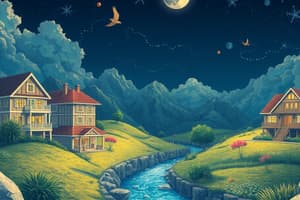Podcast
Questions and Answers
What is the primary purpose of the REALTOR® Code?
What is the primary purpose of the REALTOR® Code?
- To define the expected high standard of performance from REALTORS®. (correct)
- To limit the number of licensed real estate professionals.
- To provide a legal framework for real estate transactions.
- To protect the financial interests of real estate boards.
When was the REALTOR® Code first approved?
When was the REALTOR® Code first approved?
- 1959 by the Canadian Real Estate Association (CREA).
- 1913 by the National Association of Real Estate Boards. (correct)
- 2010 after further consumer feedback.
- 2004, to incorporate new technologies.
What is considered a fundamental aspect of the REALTOR® Code of Ethics?
What is considered a fundamental aspect of the REALTOR® Code of Ethics?
- Commitment to competence, service, and professional conduct. (correct)
- Prioritizing the needs of REALTORS® over the public.
- Guaranteeing successful real estate investments.
- Maximizing profits for real estate agencies.
How often has the REALTOR® Code been revised?
How often has the REALTOR® Code been revised?
What does the REALTOR® trademark signify according to the content?
What does the REALTOR® trademark signify according to the content?
Which of the following best describes the nature of the REALTOR® Code?
Which of the following best describes the nature of the REALTOR® Code?
What historical significance does the REALTOR® Code hold for real estate professionals?
What historical significance does the REALTOR® Code hold for real estate professionals?
What is a commonality between the REALTOR® Code, the Act, and a board's rules?
What is a commonality between the REALTOR® Code, the Act, and a board's rules?
Under what circumstance might a real estate registrant be in breach of multiple sets of rules at once?
Under what circumstance might a real estate registrant be in breach of multiple sets of rules at once?
Which action is required for a real estate professional to access the MLS®?
Which action is required for a real estate professional to access the MLS®?
What is the scope of application of the Realtor Code, in relation to MLS transactions?
What is the scope of application of the Realtor Code, in relation to MLS transactions?
According to Article 18 of the Standards of Business Practice, how should a REALTOR® conduct their business?
According to Article 18 of the Standards of Business Practice, how should a REALTOR® conduct their business?
What action must be taken for a real estate board to charge a REALTOR® for a breach under Article 18?
What action must be taken for a real estate board to charge a REALTOR® for a breach under Article 18?
What is the main purpose of the rules and regulations established by each real estate board?
What is the main purpose of the rules and regulations established by each real estate board?
What does the interpretation of Article 18 prohibit a real estate board from doing?
What does the interpretation of Article 18 prohibit a real estate board from doing?
What is the consequence of violating multiple sets of rules?
What is the consequence of violating multiple sets of rules?
A real estate professional is obligated to avoid which of the following when counseling clients?
A real estate professional is obligated to avoid which of the following when counseling clients?
A real estate professional conceals a property's development potential, resulting in a lower sale price. What ethical issue does this primarily represent?
A real estate professional conceals a property's development potential, resulting in a lower sale price. What ethical issue does this primarily represent?
A real estate professional advises a vendor to accept a lower offer without disclosing a higher potential offer. This action is considered a breach of:
A real estate professional advises a vendor to accept a lower offer without disclosing a higher potential offer. This action is considered a breach of:
A real estate professional becomes aware of a second buyer, for a property, who is willing to pay more. What action must this professional take?
A real estate professional becomes aware of a second buyer, for a property, who is willing to pay more. What action must this professional take?
In the Jackson v.Packham Real Estate Ltd. case, what was the outcome for the real estate professional's actions?
In the Jackson v.Packham Real Estate Ltd. case, what was the outcome for the real estate professional's actions?
According to Article 1, what is a core responsibility of a REALTOR®?
According to Article 1, what is a core responsibility of a REALTOR®?
Which of the following is NOT considered an 'essential fact' a real estate professional should be knowledgeable about?
Which of the following is NOT considered an 'essential fact' a real estate professional should be knowledgeable about?
What is the potential consequence if a real estate professional fails to verify information provided by a client?
What is the potential consequence if a real estate professional fails to verify information provided by a client?
What does the example involving the notary public or lawyer highlight?
What does the example involving the notary public or lawyer highlight?
In the British Columbia case, what was the REALTOR® Ms.S's primary failure?
In the British Columbia case, what was the REALTOR® Ms.S's primary failure?
What is the consequence to the new owners in the Kamloops, BC case?
What is the consequence to the new owners in the Kamloops, BC case?
If a real estate professional acts on incorrect information provided by a client, they:
If a real estate professional acts on incorrect information provided by a client, they:
What should a reasonable, prudent real estate professional do regarding information?
What should a reasonable, prudent real estate professional do regarding information?
What constitutes proper due diligence for a real estate professional?
What constitutes proper due diligence for a real estate professional?
Why is it important for a real estate professional to understand general economic trends?
Why is it important for a real estate professional to understand general economic trends?
What was the primary ethical breach committed by Ms. S in the described case?
What was the primary ethical breach committed by Ms. S in the described case?
According to the information, what is a key reason why real estate professionals should perform title searches?
According to the information, what is a key reason why real estate professionals should perform title searches?
What should a real estate professional do if there is an encumbrance on the title that will not be cleared by the seller?
What should a real estate professional do if there is an encumbrance on the title that will not be cleared by the seller?
Why is maintaining a reputation for integrity particularly important for real estate professionals?
Why is maintaining a reputation for integrity particularly important for real estate professionals?
What is a direct consequence for a real estate professional who fails to disclose important information to a buyer, as demonstrated in the case of Ms.S?
What is a direct consequence for a real estate professional who fails to disclose important information to a buyer, as demonstrated in the case of Ms.S?
In addition to disclosure, what else should a real estate professional do when aware of an irregularity in a property title?
In addition to disclosure, what else should a real estate professional do when aware of an irregularity in a property title?
What impact has computer technology and online access to land title registry records had on the responsibilities of real estate professionals?
What impact has computer technology and online access to land title registry records had on the responsibilities of real estate professionals?
What does the duty to advise 'fully, candidly, and honestly' require from a real estate professional?
What does the duty to advise 'fully, candidly, and honestly' require from a real estate professional?
What is considered the minimum action real estate professionals should take regarding the state of a land title?
What is considered the minimum action real estate professionals should take regarding the state of a land title?
According to the content, what is a real estate professional's legal and ethical duty regarding property titles?
According to the content, what is a real estate professional's legal and ethical duty regarding property titles?
Flashcards
REALTORS® Code of Ethics
REALTORS® Code of Ethics
A set of ethical guidelines for real estate professionals, aiming to ensure high standards of conduct and service to the public.
History of the REALTOR® Code
History of the REALTOR® Code
REALTOR® Code was first established by the National Association of Real Estate Boards and later adopted by the Canadian Real Estate Association (CREA).
Evolution of the REALTOR® Code
Evolution of the REALTOR® Code
The REALTOR® Code is regularly updated to address new challenges and technologies in the real estate industry.
Scope of the REALTOR® Code
Scope of the REALTOR® Code
Signup and view all the flashcards
Core Values of the REALTOR® Code
Core Values of the REALTOR® Code
Signup and view all the flashcards
Practical Application of the REALTOR® Code
Practical Application of the REALTOR® Code
Signup and view all the flashcards
Enforcement of the REALTOR® Code
Enforcement of the REALTOR® Code
Signup and view all the flashcards
REALTORS® Code
REALTORS® Code
Signup and view all the flashcards
Real Estate Act
Real Estate Act
Signup and view all the flashcards
Real Estate Board Rules and Regulations
Real Estate Board Rules and Regulations
Signup and view all the flashcards
MLS® (Multiple Listing Service)
MLS® (Multiple Listing Service)
Signup and view all the flashcards
What overlaps in real estate regulations?
What overlaps in real estate regulations?
Signup and view all the flashcards
Multiple Violations
Multiple Violations
Signup and view all the flashcards
Disciplinary Action
Disciplinary Action
Signup and view all the flashcards
Duty to Uphold the Law
Duty to Uphold the Law
Signup and view all the flashcards
Board Action Against Members
Board Action Against Members
Signup and view all the flashcards
Ethical Duty of Disclosure
Ethical Duty of Disclosure
Signup and view all the flashcards
Obligation to Disclose Better Offers
Obligation to Disclose Better Offers
Signup and view all the flashcards
Concealing Development Potential
Concealing Development Potential
Signup and view all the flashcards
Jackson v. Packham Real Estate Ltd.
Jackson v. Packham Real Estate Ltd.
Signup and view all the flashcards
Consequences of Ethical Violations
Consequences of Ethical Violations
Signup and view all the flashcards
Real Estate Professional's Duty of Knowledge
Real Estate Professional's Duty of Knowledge
Signup and view all the flashcards
Verification of Client Information
Verification of Client Information
Signup and view all the flashcards
Duty to Search for Facts
Duty to Search for Facts
Signup and view all the flashcards
Limited Dual Agent
Limited Dual Agent
Signup and view all the flashcards
Civil Liability for Unverified Information
Civil Liability for Unverified Information
Signup and view all the flashcards
Swearing Affidavits Without Verification
Swearing Affidavits Without Verification
Signup and view all the flashcards
Marijuana Grow Op
Marijuana Grow Op
Signup and view all the flashcards
Remediation
Remediation
Signup and view all the flashcards
Contract of Sale
Contract of Sale
Signup and view all the flashcards
Title Search
Title Search
Signup and view all the flashcards
Property Stigma
Property Stigma
Signup and view all the flashcards
Title Search Duty
Title Search Duty
Signup and view all the flashcards
Encumbrances
Encumbrances
Signup and view all the flashcards
Contract of Purchase and Sale
Contract of Purchase and Sale
Signup and view all the flashcards
Duty to Advise Fully
Duty to Advise Fully
Signup and view all the flashcards
Duty to Advise Honestly
Duty to Advise Honestly
Signup and view all the flashcards
Seller Disclosure Issues
Seller Disclosure Issues
Signup and view all the flashcards
Marijuana Plants and Property Disclosure
Marijuana Plants and Property Disclosure
Signup and view all the flashcards
Consequences of Failure to Disclose
Consequences of Failure to Disclose
Signup and view all the flashcards
Integrity Over Business
Integrity Over Business
Signup and view all the flashcards
Study Notes
Disclaimer Information
- This publication is for educational purposes only
- Information is subject to change without notice
- UBC, affiliates, authors, editors, and staff (UBC Group) make no claims of accuracy, completeness, or usefulness
- The UBC Group is not liable for any losses or damages from use of the information
- Information is subject to local, provincial, and federal laws and regulations
- Publication is for educational purposes only, and does not constitute legal, accounting, or other professional advice
- Professional advice should be sought before acting on the information
Learning Objectives (Chapter 5)
- Discuss the meaning of "professional ethics"
- Explain the purpose and scope of the REALTOR® Code, published by the Canadian Real Estate Association
- Discuss the ethical duties and responsibilities of real estate professionals
- Explain the importance of ethical business practices in the real estate profession
- List disciplinary procedures for real estate professionals
Introduction (Chapter 5)
- Reviews professional ethics in the real estate industry
- Discusses the Canadian Real Estate Association's (CREA) REALTOR® Code
- Provides an overview of CREA's disciplinary procedures for ethical breaches
- Not all real estate registrants are CREA members; only members are bound by the REALTOR® Code
- All real estate professionals are expected to uphold appropriate ethical standards
Professionalism
- Professionalism involves applying skills and expertise in a specific field
- Six factors indicate a profession:
- Academic basis: education and examinations
- Private practice: client-focused interaction
- Advisory function: consulting or guidance
- Tradition of service: ethical considerations before profit
Studying That Suits You
Use AI to generate personalized quizzes and flashcards to suit your learning preferences.




